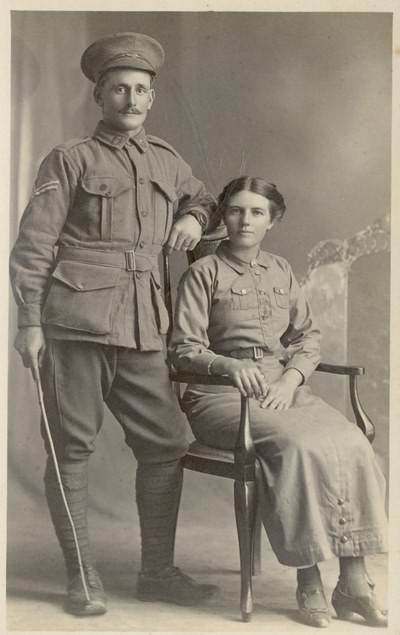
Private Louis Fudge and his wife Ellen (Nell), ca. 1915. Source: Private Collection.
State Library has recently digitised a beautiful collection of three World War I diaries written by Louis Robert Fudge of Mirani, Queensland, who served in the 41st Infantry Battalion on the Western Front. The diaries were written to his wife, Nell, and were intended as a full account of his activities during the war. In the first diary Louis writes:
To My Dear Wife Nell, As the censor has access to all letters I intend in this, and perhaps other books, to give you, in the form of a diary, as it were, a rather full account of our doings".
Louis' account is indeed very full and it is that which makes the diaries such remarkable documents. He describes in great detail absolutely everything about the everyday life of a soldier, from the mundane to the horrific. The diaries cover almost all of his service during the war from embarkation; the voyage to England, via South Africa; training at Lark Hill Camp on the Salisbury Plain; visiting family and sightseeing in England; service on the Western Front; and the voyage back to Australia.
Louis Robert Fudge (service no. 1107) was born in 1886 in Ingham, Queensland. He was the eldest son of Albert John Wellman Fudge and Naomi Hooper who had married in 1884 in Yeovil, Somerset, England. The couple migrated to Queensland five days after their marriage and eventually settled in Mirani West on a property which they named 'Yeolands' and which was their family home for over 50 years. Louis had two brothers and three sisters. The children were educated at the Mirani State School, where Louis excelled both academically and in the sporting field.
Louis enlisted on the 18th November 1915 in Rockhampton and was assigned to the 41st Battalion, 1st Reinforcement. At the time he was a 29 years old locomotive driver. In April of the previous year he had married Ellen Andrews, known as Nell, and it is to his young wife, of just over a year, that he addresses his diary entries. It must have been a great wrench for the couple to separate after such a short period of married life. From the diary we know that Nell travelled to Sydney and marched with Louis to the wharf where he was to embark on the HMAT Demosthenes on the 18th May 1916.
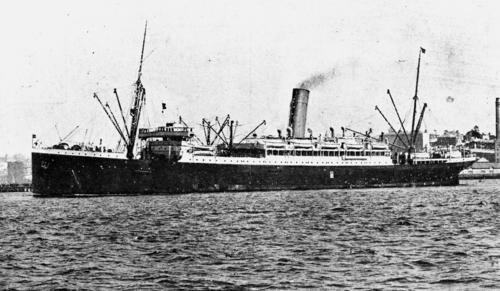
Troopship 'Demosthenes" Source: John Oxley Library, State Library of Queensland, Negative No. 65250.
The journey was not uneventful as some of the Australian troops broke ship in Cape Town, South Africa, when the men were denied shore leave due to the behaviour of Australian troops who had preceded them. Louis writes:
Another rush was made whilst fatigue men were busy loading cases of provisions and frozen mutton. This time about thirty men got ashore, though some only reached the end of the wharf, after doing a long jump from the deck. Of course, as the men raced along the wharf, the guard having been withdrawn in contemplation of pulling out, they were always cheered by those still on board, showing that they had the approval of the remainder. (Louise Robert Fudge Diary 1, Accession 30546/1, p.31)
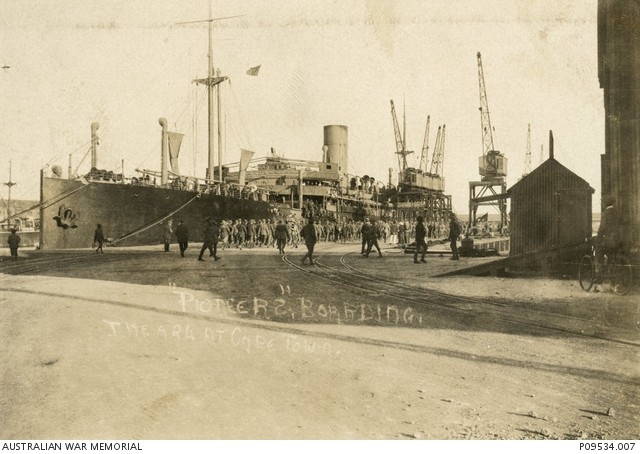
Australian troopship, HMAT Benalla, docked at Cape Town wharf, South Africa, 1916. Source: Australian War Memorial, Image ID P09534.007.
Upon arrival in England, and settling at No. 10 Camp, Lark Hill, Wiltshire, Louis was promoted to sergeant and was responsible for training Australian troops in bayonet fighting and physical education. He attended an officers' training course in Aldershot, Hampshire, visited the many relatives who lived in England, and spent Christmas of 1916 in a military hospital suffering from mumps. This illness was to have a lasting effect on his future as sadly he and Nell were never able to have children.
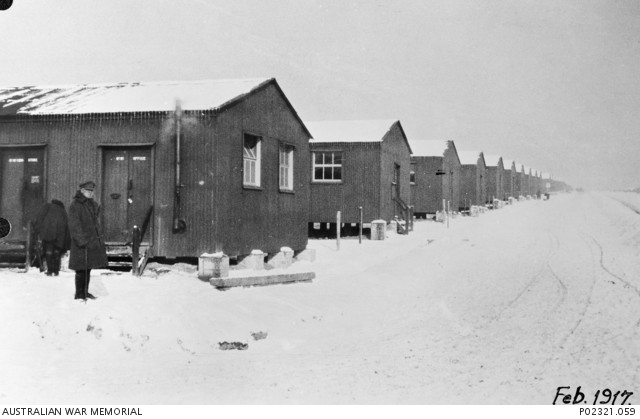
Lark Hill Camp, Wiltshire, England, in the winter of 1917. Source: Australian War Memorial, Image ID: P02321.059.
Caught up in the vital work of training troops, it was not until September 19th, 1917, that Louis made the passage to France and the front lines of the war. In Diary 2 he describes in vivid detail the bombing of Poperinghe and the total destruction of Ypres in Belgium.
1 October 1917 - By daylight we were passing thro Ypres and had a chance to view the city as it is today. it is almost impossible to describe it, and one needs to see the place really to realize the state it is in. Except for a few places there are no walls left standing. The city has been levelled to the ground and of course no civilians are left there... All decorations, partitions and so on are gone, just an interrupted skeleton as it were, remains. There is no sign of a pane of glass in the place and all is chaos. (Louis Robert Fudge Diary, 30546/3, p. 88-89)
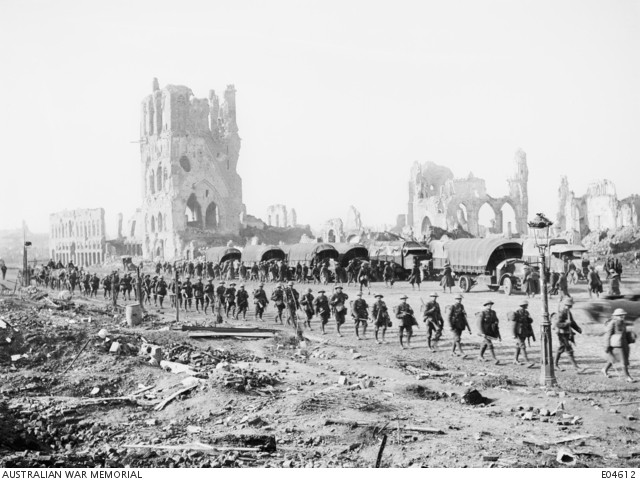
Australians marching through Ypres, Belgium, October 1917. Source: Australian War Memorial, Image ID: E04612.
On October 8th 1917 Louis was promoted to Temporary Lance Sergeant in charge of a platoon of 35 men. On the 10th October he led the platoon on the way to take over the line at Passchendaele when a shell burst among the troops, killing 4 men.
After dinner we started for out positions, a company at a time in single file. Immediately after leaving the road and whilst on the duck boards a shell struck my platoon, killing four men and wounding seven others including the officer. Three men only were left standing in front of me. The stretcher bearers immediately took what wounded men they could back and others of the platoon had to be used for the extra wounded men as stretcher bearers, and using duckboards as stretchers...On looking ahead I saw a man up in the air about forty feet amongst lumps of mud, and still intact...We were continually being shelled and had some close shaves, but after midnight I congratulated myself that Fritz had not managed to get me on my birthday. (10 October 1917, Louis Robert Fudge Diary, Accession 30546/3, p.92-93)
Diary 2 includes a list, compiled by Louis, of the wounded and dead in his own platoon.

Louis Robert Fudge Diary, No. 2. Source: John Oxley Library, Accession 30546/2.
On October 15th the 41st Battalion were relieved from the front by the 10th Brigade and moved into support positions. The harsh conditions and constant stress had weakened the men and the battalion grew smaller as more and more soldiers were sent to hospital with bad feet and trench fever. Louis was no exception and on 19 November he was sent to the 53rd Casualty Clearing Station near Bailleul after feeling sick and spitting up blood. He was diagnosed with nephritis (inflammation of the kidneys) and evacuated to England, spending Christmas 1917 in hospital.
Louis was classified as unfit for further duty, and after travelling around England, embarked for Australia on the ship Durham Castle on 16 March 1918. Sadly on the journey back home he read in a Queenslander newspaper that his younger brother, Edgar Fudge (service no. 5791), had died of wounds in Belgium on the 27 February 1918. Edgar served in the 15th Battalion and died of wounds sustained at Hessian Wood, Belgium. He was aged 21 at the time of his death.
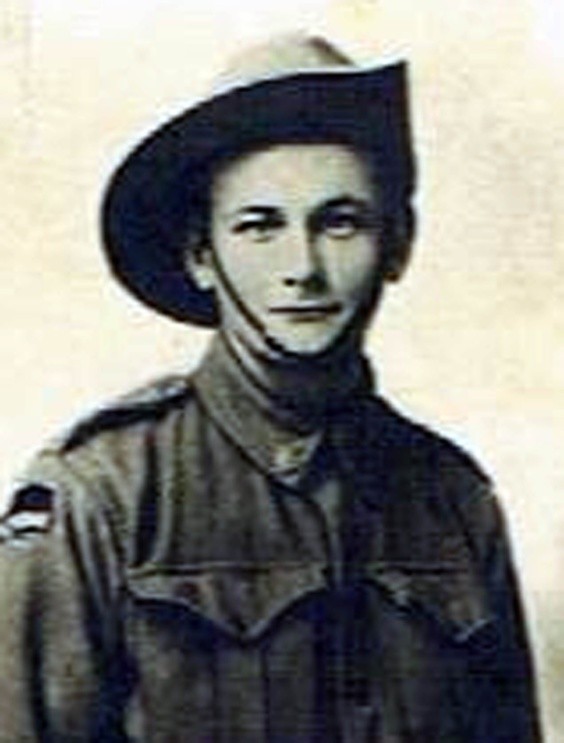
Private Edgar Fudge. Source: Private Collection.
Louis arrived in Sydney, Australia, on the 12th May 1918, to be reunited with Nell. The couple lived in Mackay and Louis resumed his position as an engine driver with Queensland Rail. He was a champion sportsman, competing as a footballer and also winning many tennis tournaments, including the Lambert Trophy in 1913. As a returned serviceman he also took a lead role in Anzac Day processions and other commemorative services. In April 1919 he led the returned soldiers of Mirani in a tree planting ceremony in commemoration of the fallen soldiers of the district (The Daily Mercury, 14 May 1919, p.3).
Louis died of stomach cancer in 1957 and the precious diaries passed into the care of his nephew, Wilfred Albert Fudge, who knew him as Uncle Lou, and who had spent many happy times with him fishing around the islands of Mackay and playing tennis together. Wilfred lovingly cared for the fragile diaries, and it is due to his foresight that they have survived the passage of time and can now take pride of place in the collections of the State Library of Queensland.
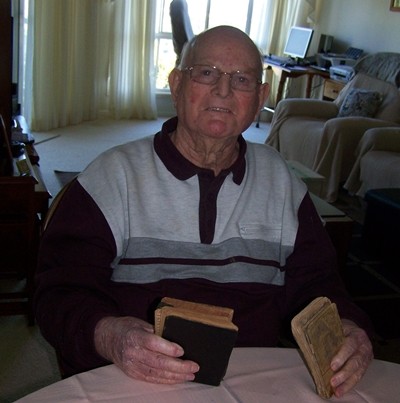
Wilfred Fudge with the diaries of his uncle, Sergeant Louis Robert Fudge. Source: John Oxley Library.
The Louis Robert Fudge Diaries, Accession 30546, may be viewed at the John Oxley Library or online.
Lynn Meyers, QANZAC100 Content Curator
Comments
Your email address will not be published.
We welcome relevant, respectful comments.